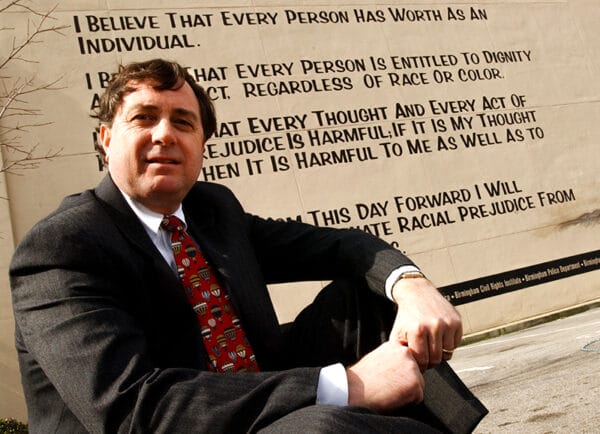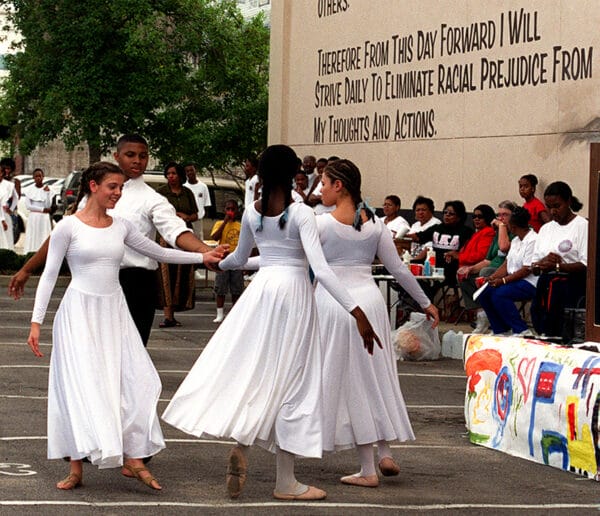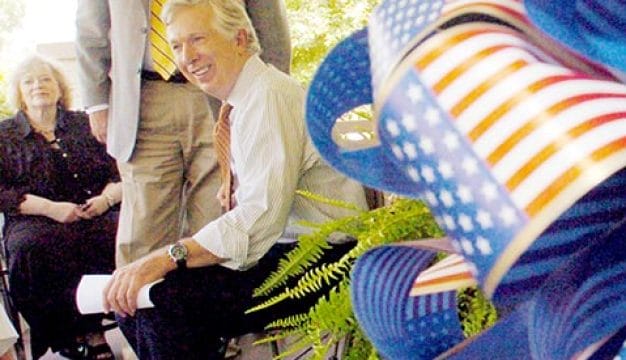Birmingham Pledge
The Birmingham Pledge is a statement of principles at the heart of a grassroots effort, started in Birmingham, to address racism and prejudice. Launched in 1998, the Pledge spread worldwide, with tens of thousands of signers. Antiracism programs in all 50 states and more than 20 countries use the Birmingham Pledge in their efforts.
 Jim Rotch
The Pledge was written by Birmingham attorney James E. Rotch in November 1997 during a return trip from a Leadership Alabama meeting in Mobile. The Pledge was initially promoted by the Community Affairs Committee of Operation New Birmingham, a diverse group of civic leaders that has met weekly since the 1960s. The Community Affairs Committee introduced it publicly at the 1998 Martin Luther King Unity Breakfast in Birmingham. There, more than 2,000 Birmingham residents joined in reciting the Pledge together. By 2008, when the Pledge celebrated its 10th anniversary, more than 120,000 individuals had returned signed copies of the Pledge or had signed the Pledge online.
Jim Rotch
The Pledge was written by Birmingham attorney James E. Rotch in November 1997 during a return trip from a Leadership Alabama meeting in Mobile. The Pledge was initially promoted by the Community Affairs Committee of Operation New Birmingham, a diverse group of civic leaders that has met weekly since the 1960s. The Community Affairs Committee introduced it publicly at the 1998 Martin Luther King Unity Breakfast in Birmingham. There, more than 2,000 Birmingham residents joined in reciting the Pledge together. By 2008, when the Pledge celebrated its 10th anniversary, more than 120,000 individuals had returned signed copies of the Pledge or had signed the Pledge online.
The Birmingham Pledge
I believe that every person has worth as an individual.
I believe that every person is entitled to dignity and respect, regardless of race or color.
I believe that every thought and every act of racial prejudice is harmful; if it is my thought or act, then it is harmful to me as well as to others.
Therefore, from this day forward I will strive daily to eliminate racial prejudice from my thoughts and actions.
I will discourage racial prejudice by others at every opportunity.
I will treat all people with dignity and respect; and I will strive daily to honor this Pledge , knowing that the world will be a better place because of my effort.
 Birmingham Pledge Week
Interest in the Birmingham Pledge expanded nationally and eventually outgrew the volunteer efforts of the Community Affairs Committee, and the Birmingham Pledge Foundation was incorporated in 2000 to coordinate programs. Today, the Birmingham Pledge Foundation is a largely grassroots nonprofit organization that collaborates with other organizations to spread the principles expressed by the Birmingham Pledge. In addition to signing drives, foundation programs include curriculum design, distribution of educational kits to schools and community groups, teacher training and resource development, and an awards program. The Lifetime Achievement Awards have honored more than 20 individuals, beginning with civil rights leader Fred Shuttlesworth in 2000. Foundation efforts also include programs for community adults and consulting services to help other communities begin similar programs. The annual Pledge Week includes a Teen Summit and other activities and takes place in September to coincide with the anniversary of the bombing of the Sixteenth Street Baptist Church that killed four young girls in 1963.
Birmingham Pledge Week
Interest in the Birmingham Pledge expanded nationally and eventually outgrew the volunteer efforts of the Community Affairs Committee, and the Birmingham Pledge Foundation was incorporated in 2000 to coordinate programs. Today, the Birmingham Pledge Foundation is a largely grassroots nonprofit organization that collaborates with other organizations to spread the principles expressed by the Birmingham Pledge. In addition to signing drives, foundation programs include curriculum design, distribution of educational kits to schools and community groups, teacher training and resource development, and an awards program. The Lifetime Achievement Awards have honored more than 20 individuals, beginning with civil rights leader Fred Shuttlesworth in 2000. Foundation efforts also include programs for community adults and consulting services to help other communities begin similar programs. The annual Pledge Week includes a Teen Summit and other activities and takes place in September to coincide with the anniversary of the bombing of the Sixteenth Street Baptist Church that killed four young girls in 1963.
The ideas expressed within the Pledge remain central to the activities of the Birmingham Pledge Foundation: to reduce prejudice and increase an appreciation for diversity and inclusion, both locally and internationally. Well-known signers of the Birmingham Pledge include Anglican Archbishop Desmond Tutu and former South African prime minister F. W. DeKlerk, former President Bill Clinton and Senator Hillary Rodham Clinton, Birmingham bombing survivor Carolyn McKinstry, author Harper Lee, General Colin L. Powell, NASCAR legend Bobby Allison, former governor Bob Riley, and many others.
Birmingham Pledge Event with Harper Lee In 2000, the Birmingham Pledge was recognized by Congress in a joint resolution with broad bipartisan support, and in 2001 President George W. Bush declared the week which includes September 15 as National Birmingham Pledge Week. The Birmingham Pledge has been included in the teachers’ guide for the Academy Award-winning 2005 documentary Mighty Times: The Children’s March and featured in the Southern Poverty Law Center‘s award-winning magazine Teaching Tolerance. In 2007, visiting delegations from the Czech Republic, Ukraine, and China received copies of the Birmingham Pledge, as did the Hungarian Ambassador Andras Simonyi and his wife. The Birmingham Pledge was cited when the Birmingham City Council adopted the Model Cities Diversity Resolution in 2007 and when the Alabama House and Senate in 2007 passed a historic state apology for slavery.



